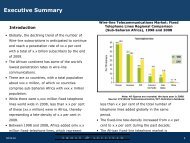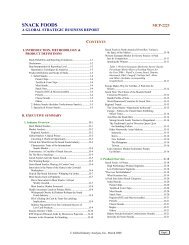the RUSSIA oil & gas competitive intelligence report - Report Buyer
the RUSSIA oil & gas competitive intelligence report - Report Buyer
the RUSSIA oil & gas competitive intelligence report - Report Buyer
You also want an ePaper? Increase the reach of your titles
YUMPU automatically turns print PDFs into web optimized ePapers that Google loves.
Russia Oil and Gas Competitive Intelligence <strong>Report</strong> 2010<br />
agreement signed by Ko<strong>gas</strong> and Gazprom in September 2008, <strong>the</strong> Korean company plans to import<br />
10bcm per annum of Russian <strong>gas</strong> between 2015 and 2045.<br />
Following <strong>the</strong> launch of <strong>the</strong> Gazprom-led Sakhalin-II project in April 2009, Ko<strong>gas</strong> began receiving<br />
Russian LNG under a 2.2bcm (1.6mn tpa) supply contract. Ko<strong>gas</strong>, one of <strong>the</strong> world’s largest <strong>gas</strong> buyers,<br />
is now looking to boost <strong>the</strong>se Russian <strong>gas</strong> imports significantly by expanding <strong>the</strong> regional LNG export<br />
capacity and/or ensuring <strong>the</strong> extension of <strong>the</strong> planned Sakhalin-Khabarovsk-Vladivostok <strong>gas</strong> pipeline into<br />
<strong>the</strong> Korean peninsula. An MoU on jointly constructing an LNG terminal on Russia’s Pacific coast was<br />
signed by Gazprom and Ko<strong>gas</strong> in September 2009. Additionally, two pipeline options between Russia<br />
and South Korea are currently being evaluated: <strong>the</strong> overland pipeline via North Korea and <strong>the</strong> direct<br />
undersea pipeline. The first option suffers from severe geopolitical risks while <strong>the</strong> second option presents<br />
partners with formidable technological and financial challenges.<br />
In April 2010 Gazprom’s head of foreign projects, Stanislav Tsyganov, said that South Korea and Russia<br />
were expected to begin a new round of talks in mid-April on a <strong>gas</strong> interconnector between <strong>the</strong> countries.<br />
However, it is unclear what route <strong>the</strong> <strong>gas</strong> interconnector could now take, following a marked deterioration<br />
in relations between <strong>the</strong> two Koreas in mid-2010. Tsyganov also poured cold water on <strong>the</strong> subsea route<br />
plans, claiming that <strong>the</strong> shallowness and uneven surface of <strong>the</strong> seabed in <strong>the</strong> area makes <strong>the</strong> project highly<br />
challenging from a technical perspective. The numerous difficulties with both pipeline options suggest to<br />
us that no concrete decision will be reached during this round of talks. Longer term, we believe <strong>the</strong><br />
pipeline will not be built until <strong>the</strong> political unification of <strong>the</strong> Korean peninsula.<br />
China<br />
In February 2009, Moscow and Beijing signed a major energy agreement that will see <strong>the</strong> Russian state<br />
<strong>oil</strong> sector receive US$25bn in Chinese loans in return for a commitment to sell China 15mn tpa of crude<br />
(300,000b/d) between 2011 and 2030. The agreement was made up of four deals. The first two concern<br />
long-term loans to be provided by <strong>the</strong> China Development Bank to Rosneft, which will receive US$15bn,<br />
and <strong>oil</strong> pipeline monopoly Transneft, which will receive US$10bn. The third is a 20-year <strong>oil</strong> supply<br />
contract between China National Petroleum Corporation (CNPC) and Rosneft, and <strong>the</strong> fourth is an<br />
agreement between CNPC and Transneft regarding <strong>the</strong> construction and exploitation of <strong>the</strong> China-bound<br />
branch of <strong>the</strong> East Siberia-Pacific Ocean (ESPO) pipeline.<br />
Although <strong>the</strong> financial terms of <strong>the</strong> deals were withheld, two unnamed Russian government sources<br />
unofficially provided details. According to an official in <strong>the</strong> Russian energy ministry, quoted by<br />
Vedomosti, <strong>the</strong> price of <strong>the</strong> <strong>oil</strong> supplied will be calibrated monthly, based on <strong>the</strong> Platts and Argus trade<br />
quotes for <strong>the</strong> Kozmino terminal. A high-level official quoted by Reuters <strong>report</strong>ed that <strong>the</strong> interest rates of<br />
<strong>the</strong> loans will be pegged to LIBOR and will fluctuate between 5% and 5.5%. According to Russian<br />
energy minister Sergei Shmatko, Rosneft and Transneft will spend <strong>the</strong> Chinese loans in two main areas:<br />
ESPO and 'corporate development', which is likely to imply debt management.<br />
© Business Monitor International Ltd Page 11









